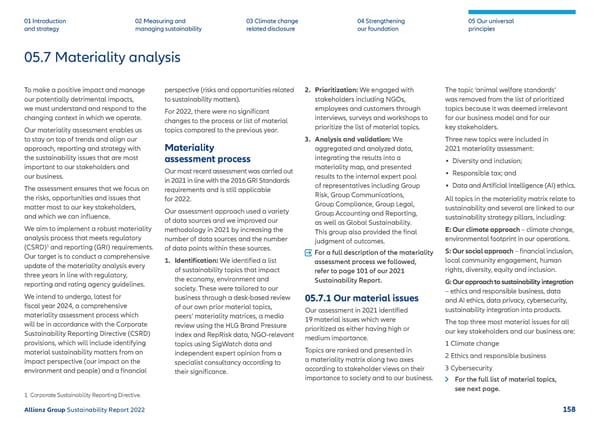01 Introduction and strategy 02 Measuring and managing sustainability 03 Climate change related disclosure 04 Strengthening our foundation 05 Our universal principles 05.7 Materiality analysis To make a positive impact and manage our potentially detrimental impacts, we must understand and respond to the changing context in which we operate. Our materiality assessment enables us to stay on top of trends and align our approach, reporting and strategy with the sustainability issues that are most important to our stakeholders and our business. The assessment ensures that we focus on the risks, opportunities and issues that matter most to our key stakeholders, and which we can influence. We aim to implement a robust materiality analysis process that meets regulatory (CSRD) 1 and reporting (GRI) requirements. Our target is to conduct a comprehensive update of the materiality analysis every three years in line with regulatory, reporting and rating agency guidelines. We intend to undergo, latest for fiscal year 2024, a comprehensive materiality assessment process which will be in accordance with the Corporate Sustainability Reporting Directive (CSRD) provisions, which will include identifying material sustainability matters from an impact perspective (our impact on the environment and people) and a financial perspective (risks and opportunities related to sustainability matters). F or 2022, there were no significant changes to the process or list of material topics compared to the previous year. Materiality assessment process Our most recent assessment was carried out in 2021 in line with the 2016 GRI Standards requirements and is still applicable for 2022. Our assessment approach used a variety of data sources and we improved our methodology in 2021 by increasing the number of data sources and the number of data points within these sources. 1. Identification: We identified a list of sustainability topics that impact the economy, environment and society. These were tailored to our business through a desk-based review of our own prior material topics, peers’ materiality matrices, a media review using the HLG Brand Pressure Index and RepRisk data, NGO-relevant topics using SigWatch data and independent expert opinion from a specialist consultancy according to their significance. 2. Prioritization: We engaged with stakeholders including NGOs, employees and customers through interviews, surveys and workshops to prioritize the list of material topics. 3. Analysis and validation: We aggregated and analyzed data, integrating the results into a materiality map, and presented results to the internal expert pool of representatives including Group Risk, Group Communications, Group Compliance, Group Legal, Group Accounting and Reporting, as well as Global Sustainability. This group also provided the final judgment of outcomes. For a full description of the materiality assessment process we followed, refer to page 101 of our 2021 Sustainability Report. 05.7.1 Our material issues Our assessment in 2021 identified 19 material issues which were prioritized as either having high or medium importance. Topics are ranked and presented in a materiality matrix along two ax es according to stakeholder views on their importance to society and to our business. The topic ‘animal welfare standards’ was r emoved from the list of prioritized topics because it was deemed irrelevant for our business model and for our key stakeholders. Three new topics were included in 2021 materiality assessment: • Diversity and inclusion; • Responsible tax; and • Data and Artificial Intelligence (AI) ethics. All topics in the materiality matrix relate to sustainability and sev eral are linked to our sustainability strategy pillars, including: E: Our climate approach – climate change, envir onmental footprint in our operations. S: Our social approach – financial inclusion, loc al community engagement, human rights, diversity, equity and inclusion. G: Our approach to sustainability integration – ethics and resp onsible business, data and AI ethics, data privacy, cybersecurity, sustainability integration into products. The top three most material issues for all our ke y stakeholders and our business are: 1 Climate change 2 Ethics and responsible business 3 Cybersecurity For the full list of material topics, see next page. 1 Corporate Sustainability Reporting Directive. > 158 Allianz Group Sustainability Report 2022
 Sustainability Report 2022 | Allianz Page 158 Page 160
Sustainability Report 2022 | Allianz Page 158 Page 160